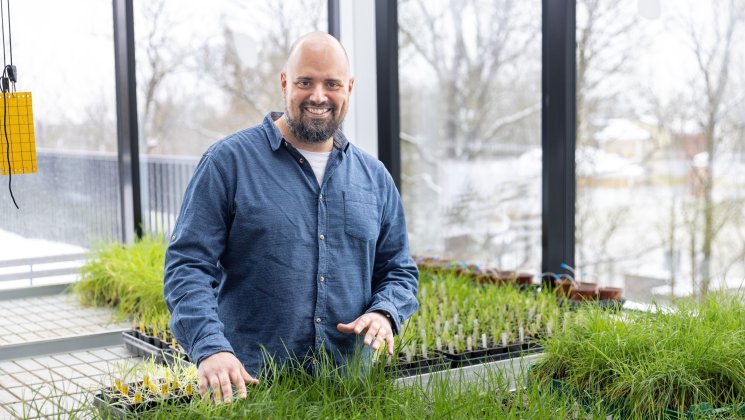Entire society must be involved in mitigating climate change and adapting to its impacts

On 13 December, the University of Tartu’s Centre for Sustainable Development was opened. The centre aims to encourage cooperation between different research fields and societal sectors to find ways to place society on a sustainable development path. At the opening event, experts discussed how natural and exact scientists, humanities and arts researchers, social scientists and health researchers could contribute to mitigating climate change and adapting to its impacts.
The participants in the panel discussion led by Margit Keller, Head of the Centre for Sustainable Development, Associate Professor in Social Communication, were Ivo Krustok, Green Transition Policy Adviser of the Government Office, and the experts of the University of Tartu’s Centre for Sustainable Development: Piia Post, Associate Professor in Meteorology and Climatology, Hans Orru, Professor of Environmental Health, Raili Marling, Professor of English, and Martin Noorkõiv, doctoral student in social studies and member of the university council.
Ivo Krustok pointed out the government’s role in shaping green policy. He says the government has an action plan for implementing the policy and to achieve the goal, collaboration between the government and the researchers is needed. According to Krustok, a growing interest in environmental and climate issues can be seen in society, so he thinks citizens should also be involved in tackling climate problems.
Piia Post said that people become aware of climate change when they notice changes in the weather: snowstorms, heatwaves, floods, severe weather, etc. She noted that some of the planetary boundaries have already been crossed. In her opinion, the problem is that necessary decisions have not been taken at the political level. When we talk in Estonia about climate change, a lot of emphasis is on mitigating change, because this is what we are required to do according to the agreements with the European Union. There is less talk about how to adapt to climate change, as this requires research and an action plan that are designed locally, considering the Estonian context. This requires bold decisions and carefully planned cooperation between policymakers and researchers.
When speaking about sustainable development, Professor of English Raili Marling highlighted people’s values and the importance of art and literature in making future scenarios tangible. “The arts can help us think outside the box. This is particularly important in major crises,” Marling said. She also stressed the importance of the choice of words: often, a meaning is attributed to words that makes people perceive them as negative. For example, when speaking about climate change, many war- and racing-related metaphors are used, which may work in the short term but can become exhausting in the long term. Thus, climate change should be preferred to climate crisis, because people are tired of being constantly reminded of crises, and the message will lose its effect. To ensure that people are more receptive to messages, it is necessary to consider the cultural values filter, rather than directly transfer slogans from one culture to another. The role of the humanities researchers in addressing sustainable development issues is not limited to supporting communication. According to Marling, in transforming consumption and production patterns, we cannot rely solely on high technology. For example, heritage technologies could offer solutions that can help create durable products and reduce waste through needs-based and inclusive manufacturing.
Martin Noorkõiv said that society already recognises climate change as a public problem, but we lack knowledge on how to tackle the climate crisis in such a way that the political system does not collapse. The biggest concern is that society is trying to change attitudes and solve the problem with the help of technology, hoping that change can be induced without changing ourselves. It is important to change entire systems and find the intervention points that can help bring about the desired transitions. This is what transition researchers-social scientists do.
“Unless we change the mass-consumerist society, it doesn’t matter if you use a paper bag or a plastic bag.” said Martin Noorkõiv.
Hans Orru pointed out that climate change has a direct impact on human health, although environmental and health issues are not often brought together at the level of decisionmakers. The health impacts of climate change need to be tackled early, then solutions will be available. As an example, Orru referred to the 2003 heatwave in France, with one of the highest casualty rates in history. By telling people in good time how to be prepared for such situations and what to do to protect their health, it would be possible to prevent tragic consequences. According to Orru, we need to start thinking about risk mitigation now, not in 2035 or 2050.
Also, we need to talk about the issues in a simple and understandable way, so that people understand that climate change affects the health of us all. Special attention must be paid to population groups who have not been much talked to on these issues. In the Estonian context, this concerns particularly Ida-Viru county, where the environmental impact on human health is already significantly more severe than in the rest of Estonia.
Climate policymaking requires closer cooperation between different fields of science, as well as between researchers and policymakers. To ensure that future cooperation would run more smoothly, the University of Tartu’s Centre for Sustainable Development was established.
Watch the recording of the panel discussion (from the 26th minute).





